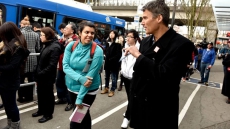OTTAWA — Was Canada's pursuit of a "progressive" trade agenda a help or a hindrance during the marathon negotiations with the U.S. and Mexico on a new continental free trade pact?
According to Conservative Leader Andrew Scheer, it was little more than "politically correct posturing" that served only to weaken Canada's negotiating position.
But according to Foreign Affairs Minister Chrystia Freeland, it was a strategy that paid off with "a very progressive trade agreement" aimed at ensuring the benefits of trade-fuelled economic growth are more equitably shared among citizens in the three countries.
To determine which of those competing claims is nearest to the truth, it's useful to recall the progressive objectives the Trudeau government set for the talks and compare them with what it actually got in the renamed United States-Mexico-Canada Agreement.
Freeland set out the objectives back in August 2017, just two days before the start of what turned out to be 14 long months of tumultuous negotiations on a new NAFTA.
A progressive agreement would encompass five ingredients, she said at that time. It would:
— Bring strong labour safeguards into the core of the agreement.
— Integrate enhanced environmental provisions to ensure no NAFTA country weakens environmental protection to attract investment and that "fully supports our efforts to address climate change."
— Add a new chapter on gender rights.
— Add another new chapter on Indigenous Peoples.
— Reform the investor state dispute settlement process to ensure governments "have an unassailable right to regulate in the public interest" without risking lawsuits by investors for alleged discriminatory practices.
Based on what's known thus far about the specifics of the USMCA, Freeland can claim to have successfully achieved two of her five objectives, winning enforceable, stronger labour standards and elimination of the investor state dispute settlement process altogether.
She can claim a partial success on environmental standards. And while she did not get separate chapters on gender rights and Indigenous Peoples, provisions on those two issues are woven throughout the agreement.
NAFTA includes only side deals on labour and the environment — essentially just aspirational goals to improve working conditions and committing each country to enforce its own labour and environmental standards.
Labour leaders have long complained that the lack of enforceable standards allowed Mexico to take advantage of its low wage rate, lack of free collective bargaining and less stringent health, safety and environmental standards to lure manufacturing companies — particularly in the automotive sector — away from the higher-wage U.S. and Canada.
The USMCA aims to fix that with a chapter on labour. According to a Canadian government summary of the chapter, it commits all three countries to protect and promote internationally recognized labour principles and rights, including the right to freedom of association and collective bargaining, the elimination of child and forced labour and laws ensuring acceptable work conditions with respect to minimum wages, hours of work and occupational health and safety.
It also requires the three countries to implement policies to prevent employment discrimination on the basis of gender, including issues related to pregnancy, sexual harassment, sexual orientation, gender identity and caregiving responsibilities.
The chapter requires each country to create a means for the public to raise concerns about labour issues. And it permits parties to seek recourse under the dispute settlement provision of the agreement in cases of non-compliance.
Apart from the labour chapter, the USMCA requires that 40 per cent of the content of automobiles must be produced by workers earning at least US$16 per hour to qualify for duty-free movement across the continent.
"This is all about protecting high-wage workers in a trade agreement and I can think of nothing that is more central to the progressive agenda than that," Freeland said Monday.
In the environmental chapter, the three countries commit to maintain high levels of environmental protection, including obligations to combat illegal wildlife trade and illegal logging and fishing, conserve species at risk, and take measures to protect the ozone layer and address marine pollution. It includes a binding commitment to ban shark finning and introduces articles on air quality and marine litter.
The environmental standards are all subject to binding and enforceable dispute resolution.
While the environment chapter is more robust than the side agreement in NAFTA, Freeland did not manage to persuade the U.S. to include any mention of climate change.
The chapter does recognize "the important role of Indigenous Peoples" in protecting the environment and "takes into account the constitutional rights of Canada's Aboriginal peoples" with respect to harvesting of resources, according to a government summary.
That's just one of a number of references to Indigenous Peoples in the USMCA.
Government official familiar with parts of the agreement not yet made public say the deal also specifically confirms that a government can adopt whatever measures it deems necessary to fulfil its legal obligations to Indigenous Peoples. For Canada, that includes aboriginal rights recognized in section 35 of Canada's Constitution.
It preserves the right to adopt measures conferring aboriginal rights or privileges with respect to cross-border trade in services and investment and ensures that state-owned enterprises may accord preferential treatment to Indigenous individuals and groups in the purchase of goods and services.
The new pact also encourages the three countries to enhance commercial opportunities for small and medium-sized enterprises owned by under-represented groups, including women and Indigenous Peoples, and encourage their participation in international trade.
And, in a first for a Canadian trade agreement, it includes a special process by which hand-crafted Indigenous textiles and apparel can be eligible for duty-free treatment.
The USMCA also includes a corporate responsibility provision reaffirming the importance of encouraging businesses to respect gender equality and Indigenous rights, among other standards.




